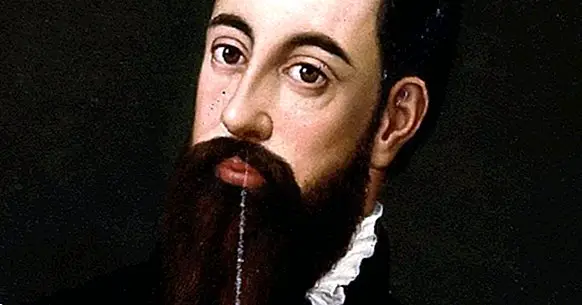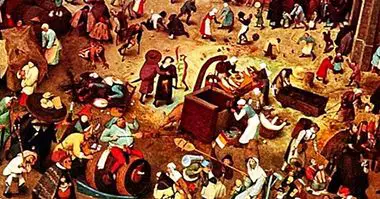The 10 most inspiring poems by Garcilaso de la Vega
Garcilaso de la Vega is known to be one of the most important poets , being considered one of the greatest exponents of the lyric of the Golden Age and one of the greatest writers in history.
This writer and military man of Toledo origin, probably born in 1501 (although others in the concrete year of his birth is uncertain, may also have been born in 1498) and died in 1536, is known to be the pioneer in introducing Renaissance poetry and Hendecasyllabic verses (of eleven syllables) in our country as well as for employing in their works an intimate, musical and emotionally expressive tone that tended to avoid the pomposity typical of previous eras.
Despite its great importance, the work of this author was relatively short and would not be published until years after his death: it consists of a quarantine of sonnets, three eclogues, an epistle, two elegies and five songs. All of them of great beauty and being love one of its main themes. In order to be able to admire his work, throughout this article we are going to expose some of the best known poems by Garcilaso de la Vega .
- Related article: "The 15 best short poems (from famous and anonymous authors)"
A short selection of poems by Garcilaso de la Vega
Here we offer a series of examples of the poetry of Garcilaso de la Vega, all part of their sonnets and mostly focused on aspects such as love and melancholy. His main source of inspiration was probably his feelings towards Isabel Freyre , which would become his platonic love and who lived his marriage with another man and then his death (something that explains the despair and melancholy that expresses much of the author's work), as well as friendship.
1. Sonnet 1
When I stop to contemplate my state and to see the steps taken by me, I find, according to what I lost, that the greater evil could have come;
but when on the road he was forgotten, I do not know why I came so badly; I know I'm done, and I've felt more and more to see my care finished with me.
I will finish, that I gave myself without art to someone who will know how to lose me and finish me if he wants, and he will still know what to do; that my will can kill me, his will, which is not so much on my part, being able, what will he do but hack it?
This first sonnet refers to the observation of our past, to look back and assess what has been achieved in life and where it has come from, as well as the sadness generated by an unrequited love .
- Maybe you're interested: "23 poems by Pablo Neruda that will fascinate you"
2. Sonnet V
Written in my soul is your gesture, and how much I write of you I wish; you only wrote it, I read it so alone, that even of you I keep in this.
In this I am and I will always be put; that although it does not fit in me how much in you I see, of so much good what I do not understand I believe, already taking the faith by budget.
I was not born but to love; my soul has cut you to your measure; by habit of the soul I love you.
When I have confess I must; for you I was born, for you I have life, for you I have to die, and for you I die.
This fifth sonnet by Garcilaso expresses us your feelings and feelings when you see the person you love , the energy and the desire to be with her that generates it and the memory of each one of her gestures.
3. Sonnet XXVI
The foundation that my tired life sustained was lying on the ground. Oh how much good it ends in just one day! Oh, how many hopes does the wind carry?
Oh, how idle is my thought when it deals with the good of my thing! To my hope, as well as to waste, a thousand times my torment punishes me.
The more times I surrender, the other I resist with such fury, with a new force, that a mount put on top would break.
This is the desire that leads me, to want to see one day who it would be better never to have seen.
In this sonnet we notice the pain provoked by a love that has not been and can not be again, as well as the suffering that the author generates in the death of his platonic love, Isabel Freyre.
4. Sonnet XXXVIII
I am still in tears bathed, always breaking the air with sighs, and it hurts me more not to dare to tell you that I have arrived for you in such a state;
that seeing me I am and what I have walked along the narrow path of following you, if I want to return to flee, I faint, seeing what I have left behind;
and if I want to climb to the high summit, at every step spawn me in the way sad examples of those who have fallen; above all, I am already lacking the fire of hope, with which I used to walk through the dark region of your forgetfulness.
In this poem, Garcilaso talks about a problem that continues in many people today: the struggle between loving and wanting to stop loving someone that does not belong to us.
5. Sonnet XXVIII
Boscan, you are avenged, with my diminution, of my past rigor and my harshness with which you reproach the tenderness of your soft heart used to.
Agora punished me every day for such a savagery and such awkwardness: but it is in time that from my baseness I could run and punish myself very well.
Know that in my perfect age and armed, with my eyes open I have surrendered to the child you know, blind and naked.
Of such a beautiful fire consumed it was never a heart: if I ask, I am the rest, in the rest I am dumb.
In this poem the author refers to the fact of having reproached a friend something that the same author is doing now: get carried away by passion and love towards someone.
6. Sonnet XXIX
The sea passed Leandro the spirited, in loving fire all burning, strained the wind, and was raging the water with an angry impetus.
Vanquished by hard work, contrasting the waves not being able to, and more of the good that he lost there dying than of his own troubled life, as he could, 'he strengthened his tired voice
and to the waves he spoke in this way, but never was his voice heard: "Waves, well do not excuse me and die, let me get there, and your fury turned that into my life".
The author refers to the Greek myth of Leandro and Hero , in which two young lovers who lived each one on the side of the Dardanelles Strait or Hellespont and separated by the opposition of their families met every night, leaving Hero a light on in the tower where he lived so that Leandro could cross I swim the strait in order to be together. One night the wind blew out the light that was guiding Leandro, losing himself and drowning himself and committing suicide on learning of the end of his beloved.
7. Sonnet XXXI
Within my soul was born of me a sweet love, and of my feeling so approved was his birth as of a single desired son;
but after he was born, he has completely ravaged the loving thought; in harsh rigor and in great torment the first delights has returned.
O crude grandson, who gives life to the father and kills the water, why do you grow so dissatisfied with the one you were born?
Oh jealous fear! Who do you look like? Even the invidia, your own fierce mother, is frightened to see the monster she has given birth.
Garcilaso talks about jealousy here , and how they are capable of transforming and destroying the very love that allowed their birth.
8. Sonnet XXIII
As much as rose and lily are shown the color in your gesture, and that your gaze ardent, honest, with clear light serene tempest;
and while the hair, which in the vein of gold was chosen, with a quick flight through the beautiful white neck, upright, the wind moves, scatters and messes:
Take from your cheerful spring the sweet fruit before the angry weather covers the beautiful summit with snow.
The rose will wither the icy wind, everything will change the light age for not moving in their habit.
The poetry reflected here tells us about the beauty of youth, as well as urges us to seize the moment before the time passes and this youth ends up vanishing .
9. Sonnet IV
For a while my hope rises, more tired of having risen, it falls again, that leaves, to bad my degree, free the place to distrust.
Who will suffer such a harsh change from good to evil? Oh tired heart, strive in the misery of your state, that after fortune there is usually bonanza!
I will undertake by force of arms to break a hill that another did not break, of a thousand very thick inconveniences;
death, imprisonment can not, nor pregnancies, get away from going to see you as you want, naked spirit or man in flesh and blood.
This sonnet is one of the few in which there is no reference to the figure of the beloved. In this case Garcilaso tells us about his stay in prison, in Tolosa , after having attended his nephew's wedding. This wedding did not have the permission of the Emperor Carlos I, sending this one to imprison the poet and military man.
10. Sonnet VIII
From that good and excellent sight come alive and glowing spirits, and being received by my eyes, they pass me to where evil feels.
Enter the road easily, with mine, so moved heat, come out of me as lost, called of that good that is present.
Absent, in memory I imagine it; my spirits, thinking that they are seeing it, move and light without measure;
but not finding the way easy, that theirs coming melting, bursting out, there is no way out.
In this sonnet we are presented with a situation in which the author and the beloved look each other in the eye, establishing an act of deep and even spiritual communication . We observe the sensations generated by the look of the beloved person, as well as the melancholy that causes his memory.
Bibliographic references:
- Morros, B. (ed.). (2007). Garcilaso de la Vega: Poetic work and prose texts. Editorial Critic



















